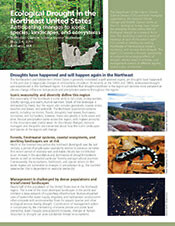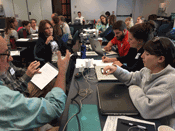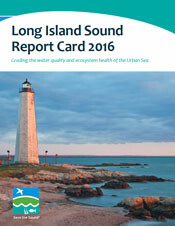Video & Blog Highlights
Video
- Michael Kolian presented the latest Science for Citizens seminar titled "EPA's Climate Change Indicators: Overview". A video recording is available on IAN's website and YouTube.
Blog
- UMCES active in the 2016 River Symposium in Delhi, India
- The report card game "Get the Grade!" was launched in Stockholm, New Delhi, and Honolulu
Ecological Drought in the Northeast United States newsletter
 The Department of the Interior Climate Science Centers (CSCs) and their managing organization, the National Climate Change and Wildlife Center at the U.S. Geological Survey have chosen the emerging climate science field of ecological drought as a research focus area. This newsletter highlights the outcomes of a two-day workshop held at the Northeast CSC in Amherst, Massachusetts, as part of a series of meetings at each of the nation's eight CSCs. These workshops are aimed at collating our existing knowledge of the ecological impacts, resistance, and recovery from drought. The Northeastern and Midwestern United States are generally considered a well-watered region, yet droughts have happened in the past due to large-scale changes in atmospheric circulation. As recently as the 1960s and 1980s, widespread drought was experienced in this Northeast region. It is predicted that drought conditions in the region will become more prevalent as climate change influences temperature and precipitation patterns throughout the region.
The Department of the Interior Climate Science Centers (CSCs) and their managing organization, the National Climate Change and Wildlife Center at the U.S. Geological Survey have chosen the emerging climate science field of ecological drought as a research focus area. This newsletter highlights the outcomes of a two-day workshop held at the Northeast CSC in Amherst, Massachusetts, as part of a series of meetings at each of the nation's eight CSCs. These workshops are aimed at collating our existing knowledge of the ecological impacts, resistance, and recovery from drought. The Northeastern and Midwestern United States are generally considered a well-watered region, yet droughts have happened in the past due to large-scale changes in atmospheric circulation. As recently as the 1960s and 1980s, widespread drought was experienced in this Northeast region. It is predicted that drought conditions in the region will become more prevalent as climate change influences temperature and precipitation patterns throughout the region.
Science communication courses in Narragansett, RI and Cambridge, MD
 IAN conducted two Communicating Science Effectively courses in October. Jane Thomas, Jane Hawkey, and Dylan Taillie travelled to Narragansett, RI on October 4-5 to teach a course to participants associated with the Narragansett Bay National Estuarine Research Reserve. The course was taught at the Coastal Institute at the University of Rhode Island Bay Campus. Participants came from local, state, and federal government agencies as well as non-government organizations and universities. On October 11-12, IAN staff Alex Fries, Caroline Donovan, Simon Costanzo, Jane Thomas, and Jane Hawkey taught the course in Cambridge, MD to the Sea Grant Class of 2016 Knauss Fellows. Participants in both courses learned about making conceptual diagrams, giving effective presentations, and producing printed media.
IAN conducted two Communicating Science Effectively courses in October. Jane Thomas, Jane Hawkey, and Dylan Taillie travelled to Narragansett, RI on October 4-5 to teach a course to participants associated with the Narragansett Bay National Estuarine Research Reserve. The course was taught at the Coastal Institute at the University of Rhode Island Bay Campus. Participants came from local, state, and federal government agencies as well as non-government organizations and universities. On October 11-12, IAN staff Alex Fries, Caroline Donovan, Simon Costanzo, Jane Thomas, and Jane Hawkey taught the course in Cambridge, MD to the Sea Grant Class of 2016 Knauss Fellows. Participants in both courses learned about making conceptual diagrams, giving effective presentations, and producing printed media.
Second Long Island Sound Report Card released
 Save the Sound, a bi-state program of Connecticut Fund for the Environment, released the second Long Island Sound Report Card at two simultaneous events in Flushing, New York and New Haven, Connecticut. The events were attended by state senators and representatives, federal and state agency representatives, non-governmental organizations, and academic institutions. The report card is a collaborative effort by all these groups. The water quality health of Long Island Sound ranges from very poor in the western Narrows, where New York City is located, to very good in the eastern Sound, where New London, CT is located. The waters of Long Island Sound are stressed by high nitrogen levels, which in turn lead to large algal blooms, low dissolved oxygen, and poor water clarity.
Save the Sound, a bi-state program of Connecticut Fund for the Environment, released the second Long Island Sound Report Card at two simultaneous events in Flushing, New York and New Haven, Connecticut. The events were attended by state senators and representatives, federal and state agency representatives, non-governmental organizations, and academic institutions. The report card is a collaborative effort by all these groups. The water quality health of Long Island Sound ranges from very poor in the western Narrows, where New York City is located, to very good in the eastern Sound, where New London, CT is located. The waters of Long Island Sound are stressed by high nitrogen levels, which in turn lead to large algal blooms, low dissolved oxygen, and poor water clarity.
IAN welcomes Qian Zhang
 Qian Zhang has joined UMCES as a monitoring data analyst at the Chesapeake Bay Program (CBP). Within the CBP's Scientific, Technical Assessment and Reporting team, his main role is to develop statistical methods of data analysis that use the extensive data available through the CBP partnership to better understand factors that drive water quality patterns. Qian obtained his Ph.D. in Environmental Engineering from Johns Hopkins University (JHU), in addition to two master degrees from JHU (one in environmental engineering and the other in statistics). He is both thrilled and thankful to have this opportunity to stay in the Chesapeake community and to continue contributing his skills toward Chesapeake Bay management and protection. Qian lives in Baltimore with his wife Claire and son Lucas. In his free time, he enjoys family road trips and playing soccer.
Qian Zhang has joined UMCES as a monitoring data analyst at the Chesapeake Bay Program (CBP). Within the CBP's Scientific, Technical Assessment and Reporting team, his main role is to develop statistical methods of data analysis that use the extensive data available through the CBP partnership to better understand factors that drive water quality patterns. Qian obtained his Ph.D. in Environmental Engineering from Johns Hopkins University (JHU), in addition to two master degrees from JHU (one in environmental engineering and the other in statistics). He is both thrilled and thankful to have this opportunity to stay in the Chesapeake community and to continue contributing his skills toward Chesapeake Bay management and protection. Qian lives in Baltimore with his wife Claire and son Lucas. In his free time, he enjoys family road trips and playing soccer.